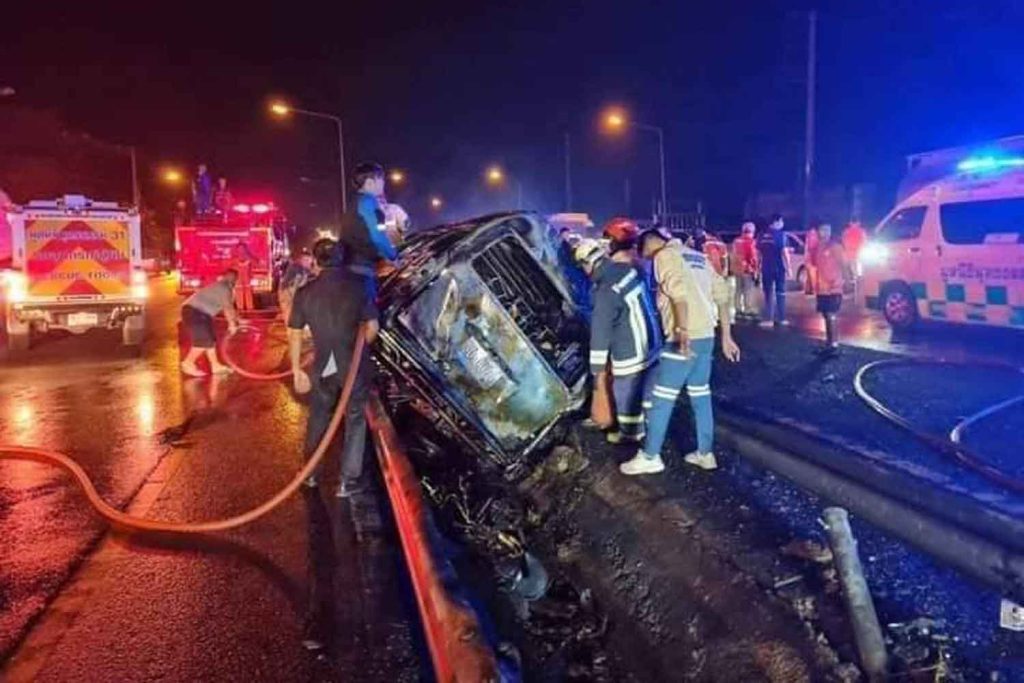A 50-year-old Swedish man died instantly when the motorcycle he was riding crashed into a roadside ditch in Roi Et Thailand just days after meeting his Thai girlfriend online.
On Saturday afternoon, Stefan Mattias was discovered dead in a ditch on Suvarnabhumi-Ban Dong Mai Road in Suvarnabhumi district’s tambon Thung Sri Muang of Rai Et in northeast central Thailand..
After being notified of the accident at approximately 2.30pm, police and rescue workers rushed to the scene.
They discovered Mattias in the ditch, suffering from a broken neck and a deep gash in his right thigh. His motorcycle was severely damaged. It appears to have collided with a concrete sewer pipe in the ditch.
His heartbroken 27-year-old Suvarnabhumi district girlfriend said she met the Swedish man online two years ago and had kept in touch with him since.
Mattias had recently taken time off from work to travel to Thailand. She stated that they had met in person for the first time five days prior and had decided to marry.
He was staying at the woman’s home in tambon Jampakhan, and her relatives knew about their relationship.
On Saturday, after lunch, Mattias told her he wanted to ride his motorcycle around the neighborhood and take pictures. She cautioned him to ride carefully. Soon after, she learned of the fatal accident that occurred about six kilometers from her village.
Too Many Unsafe Passenger Vans on the Roads
The heinous road accident in Nakhon Ratchasima on Jan 23 night should serve as a wake-up call for Transport Minister Saksayam Chidchob to reconsider allowing converted vans to be used for public transportation.
The accident, in which 11 passengers died after the LNG-powered van crashed into the median of the Mittrapap highway and exploded, has reignited public debate about the safety and road worthiness of public vans, as well as whether policymakers are doing enough to protect public safety.
It should be noted that road safety experts have already concluded that public passenger vans, which are typically converted from personal passenger or even delivery vans, are unfit for use as public transportation vehicles and should be replaced with larger mini-buses. The junta government made it a legal requirement several years ago that operators of old public vans that had been in service for more than ten years replace them with minibuses beginning in August 2019.
However, the policy failed because Transport Minister Saksayam repealed the mandatory aspect of the requirement in 2019 and also increased the shelf-life of passenger vans from 10 to 12 years. Operators were instructed to improve various aspects of their service, such as installing GPS and providing safety equipment such as fire extinguishers and rubber hammers to smash windows when necessary, in order to improve safety.
The policy reversal was in response to public van operators’ lobbying for leniency due to the economic consequences of the Covid-19 pandemic.
Mr. Saksayam has been outspoken in his belief that accidents are the fault of drivers, not the result of having unsafe public vans on the road. For instance, after another gruesome accident in August 2019 when 12 Lao migrant workers and their Thai driver were killed in Sa Kaeo, Mr. Saksayam was quoted warning the public that “passengers must not ride with drivers who look unfit behind the wheel”.
Mr. Saksayam has yet to make a public statement about the most recent accident. Apparently, the policy he advocates is ineffective in terms of saving lives.
It should be noted that most passenger vans in Thailand are LPG-powered. As a result, LPG gas tanks are frequently installed in the back of vans. When these vans are hit from behind, rescue operations become more difficult. One particularly heinous example was the recent Jan. 9 collision, in which a passenger van doubling as a student bus was struck by another vehicle in precisely this manner.
Rescue workers reportedly had to cut through metal to bring eight students trapped in the van out. The gas tank was damaged and caught fire as the volunteers used the tools required to pry open a way out of the van.
Minister Saksayam needs to get a grip on reality. His attitude toward road safety is highly dubious. Of course, reckless drivers contribute to road accidents, but appropriate and sturdy public transportation vehicles play an important role in mitigating this risk.
With the economy improving, the transport ministry should resume requiring van operators to decommission old vans. If Mr. Saksayam refuses to do so, other parties must include mini-bus safety proposals in their election manifestos.
These are entirely feasible changes, and the previous, albeit abandoned, policy incentivized operators with low-interest loans to smooth the transition. Of course, this would cost several billion baht, but given the number of road deaths across the country, it would be money well spent.
Thailand Reports Decline in Covid-19 Cases Despite Increased Tourism
Thailand Reports Decline in Covid-19 Cases Despite Increased Tourism




